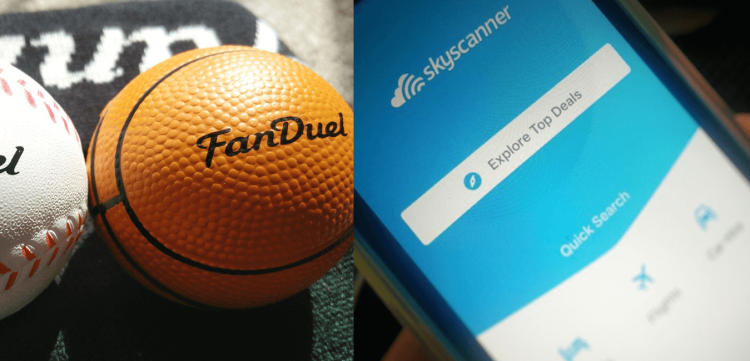Travel search engine giant Skyscanner revealed today that it is to be acquired by one of China’s biggest online travel companies in a deal worth £1.4 billion (USD$1.74 billion). Skyscanner had raised the first significant round of funding in its 12-year history last December, sucking up £128 million (USD$192 million) at a valuation of $1.6 billion.
Last week, news emerged that fantasy sports titans FanDuel and DraftKings are to merge, as a way of cutting down on legal costs and advertising spending. Both companies were already valued at more than $1 billion, which conferred on them their much-coveted “unicorn” status.
On the surface, Skyscanner’s exit bears little connection to that of the aforementioned fantasy sports duo, but digging down into the backgrounds of Skyscanner and FanDuel, some interesting parallels emerge.
Made in Scotland
Scotland isn’t particularly well-known for its unicorn startups or high-profile mergers and acquisitions, but the U.K. constituent country has been home to Skyscanner since its inception way back in 2003, and to FanDuel since it was a virtual money news prediction platform called HubDub in 2009.
But Skyscanner and HubDub not only operate in the very same city, they are located in the very same office block, a glass-facade building in the center of the Scottish capital, Edinburgh.

Above: Quartermile, Edinburgh: Home to Skyscanner and FanDuel
Although FanDuel’s official headquarters is now in the U.S. (New York), given that it’s where the vast chunk of the company’s business currently takes place, its main engineering and operational hub remains in Edinburgh.
In an interview with VentureBeat back in May, FanDuel cofounder and CEO Nigel Eccles explained the rationale for keeping the company’s main base in Edinburgh when the entirety of its business was in North America. “When we went to the States pitching, we always seemed to end up on the West Coast,” he said. “But we found that by the time we started to raise significant amounts of money, we had already built a very good engineering base in Edinburgh. So once we got to scale, we said Edinburgh should really be our engineering base, rather than trying to move everything to the U.S.”
The daily fantasy sports (DFS) industry has taken a hammering over the past year, with states such as New York and Illinois suggesting that “betting” on virtual sports teams compiled from real pro and college athletes isn’t actually a game of skill — as FanDuel and DraftKings contest — but could instead be illegal gambling. With battles continuing on a state-by-state basis, FanDuel and DraftKings have elected to pool their resources, though their status as kingpins in what is already a highly regulated industry means the merger will likely face some scrutiny from the antitrust watchdogs.
Skyscanner’s proposed acquisition by China’s Ctrip, however, has already been approved by both companies’ directors and should close in late 2016, subject to the “customary closing conditions.”
Scottish tech company exits are uncommon, but not unheard of. Back in 2012, Yammer snapped up document collaboration startup OneDrum, which was based in Stirling, and Yammer itself was acquired by Microsoft shortly after in a $1.2 billion deal. And back in 2014, an audio chip giant was created when Cirrus Logic bought Edinburgh-based Wolfson Microelectronics for a cool $467 million. Earlier this year, Two Big Ears, a virtual reality audio company based in Edinburgh, was bought by Facebook.
Then there’s Edinburgh-headquartered Rockstar North, which, under its former guise as DMA Design, created the massively popular Grand Theft Auto franchise that led to its acquisition by Take-Two Interactive in an $11 million deal back in 2000.
So while Skyscanner and FanDuel’s respective exits aren’t unprecedented, the proximity of the deals in terms of both timing and physical location is certainly notable. It could suggest that the Scottish startup scene is maturing, or it could be little more than a simple coincidence involving two successful companies that happened to share a newly built office complex in the heart of the country’s capital. Only time will tell.
VentureBeat's mission is to be a digital town square for technical decision-makers to gain knowledge about transformative enterprise technology and transact. Learn More

